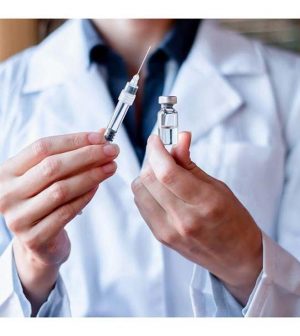- 10 Strategies to Overcome Insomnia
- Could Artificial Sweeteners Be Aging the Brain Faster?
- Techniques for Soothing Your Nervous System
- Does the Water in Your House Smell Funny? Here’s Why
- Can a Daily Dose of Apple Cider Vinegar Actually Aid Weight Loss?
- 6 Health Beverages That Can Actually Spike Your Blood Sugar
- Treatment Options for Social Anxiety Disorder
- Understanding the Connection Between Anxiety and Depression
- How Daily Prunes Can Influence Cholesterol and Inflammation
- When to Take B12 for Better Absorption and Energy
FDA Questions Strength of Johnson & Johnson’s Booster Shot Data

In a development that could mean Johnson & Johnson might encounter resistance over its application for authorization of a booster shot of its coronavirus vaccine, a new analysis filed by the U.S. Food and Drug Administration on Wednesday suggests the company’s evidence may not be strong enough for approval.
A key test used by the company to measure immune response from a booster shot six months after the original shot was likely not sensitive enough, according to the FDA analysis. The agency also questioned whether the boost in immune response was as big as the data suggested.
“It is likely that the results seen are due to the low sensitivity of the psVNA assay used,” the agency stated in its report.
Also, the agency said that it didn’t have enough time before Friday’s meeting on the J&J booster shot to independently review much of the raw data from a number of company trials on the booster.
About 15 million Americans have received the J&J vaccine, and now it’s not clear if they’ll be given the green light to get a booster shot of the same vaccine, or will have to get one using another vaccine, the New York Times reported.
In its application for booster shot approval, Johnson & Johnson included the results of a large-scale trial that began last November, in which they gave half their volunteers a second dose two months after the first. The other half received a placebo.
In August, the company said the U.S. portion of that trial showed an overall efficacy rate of 94%, but the FDA analysis focused on the worldwide results, in which the increase rose to 75%, the Times reported.
Against severe to critical COVID-19, two shots had an efficacy of 100%. But regulators warned in the analysis that there was little data from that trial on the highly contagious Delta variant, which now causes the vast majority of infections in the United States.
The FDA did note the company trial showed a potential boost in protection from a J&J booster given two months after the first shot.
“Although not independently confirmed by FDA from datasets, summaries of the data suggest there may be a benefit in a second dose administered approximately 2 months after the primary dose,” the agency said.
A Johnson & Johnson spokesperson did not immediately respond to a request for comment on the FDA analysis, the Times said.
The FDA has already approved a booster shot for Pfizer’s COVID-19 vaccine for people who are older than 65 or have health conditions or workplace exposures that put them at risk.
Moderna has also submitted a booster shot application that will be evaluated by FDA advisers on Thursday, the Times reported.
More information
Visit the U.S. Food and Drug Administration for more on COVID vaccines.
SOURCE: New York Times
Source: HealthDay
Copyright © 2026 HealthDay. All rights reserved.










